Titanic (1997)
Starring Leonardo DiCaprio, Kate Winslet, Bill Paxton, Billy Zane | based on a screenplay by director James Cameron, whose fictional love story is intertwined with a chronicle of the April 1912 Titanic sinking| REEL FACE: | REAL FACE: |
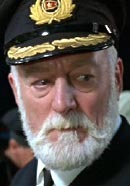 Bernard Hill
Born: December 17, 1944 Birthplace: Manchester, England, UK | 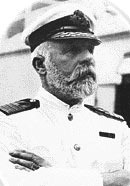 Captain Edward John Smith
Born: January 27, 1850 Birthplace: Hanley, Stoke-on-Trent, England Death: April 15, 1912, Atlantic Ocean (perished during sinking of RMS Titanic) |
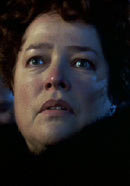 Kathy Bates
Born: June 28, 1948 Birthplace: Memphis, Tennessee, USA | 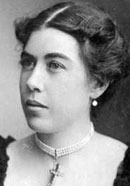 Margaret "Molly" Brown
Born: July 18, 1867 Birthplace: Hannibal, Missouri Death: October 26, 1932, Barbizon Hotel, New York City (brain tumor) |
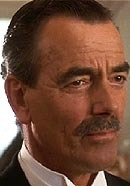 Eric Braeden
Born: April 3, 1941 Birthplace: Kiel, Germany | 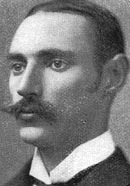 John Jacob Astor
Born: July 13, 1864 Birthplace: Rhinebeck, New York Death: April 15, 1912, Atlantic Ocean (perished in Titanic disaster) |
 Victor Garber
Born: March 16, 1949 Birthplace: London, Ontario, Canada | 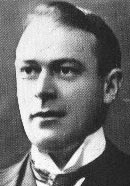 Thomas Andrews
Born: February 7, 1873 Birthplace: Comber, County Down, Ireland Death: April 15, 1912, Atlantic Ocean (perished in Titanic sinking) |
 Jonathan Hyde
Born: May 21, 1947 Birthplace: Brisbane, Australia | 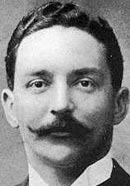 Bruce Ismay
Born: December 12, 1862 Birthplace: Crosby, Merseyside, England Death: October 15, 1937, Liverpool, England (cerebral thrombosis) |
 When anyone asks me how I can best describe my experience in nearly forty years at sea, I merely say, uneventful. Of course there have been winter gales, and storms and fog and the like. But in all my experience, I have never been in any accident… or any sort worth speaking about. I have seen but one vessel in distress in all my years at sea. I never saw a wreck and never have been wrecked nor was I ever in any predicament that threatened to end in disaster of any sort.
When anyone asks me how I can best describe my experience in nearly forty years at sea, I merely say, uneventful. Of course there have been winter gales, and storms and fog and the like. But in all my experience, I have never been in any accident… or any sort worth speaking about. I have seen but one vessel in distress in all my years at sea. I never saw a wreck and never have been wrecked nor was I ever in any predicament that threatened to end in disaster of any sort. - Captain E.J. Smith, Captain of the RMS Titanic
- Captain E.J. Smith, Captain of the RMS Titanic
Questioning the Story:

Were Jack and Rose based on real people?
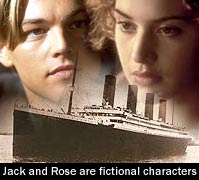
I heard there was a J. Dawson on board the Titanic, is that true?
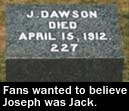
Who sketched Jack's drawing of Rose that we see in the movie Titanic?

Were the movie's underwater shots of the Titanic wreckage real?
Were any of Pablo Picasso's paintings lost with the Titanic?
No. After Rose (Kate Winslet) boards the ship in the movie, we see her displaying authentic paintings by the then barely-known painter, Pablo Picasso. Cal (Billy Zane) comments that the artist will never amount to anything. This is an obvious point of humor in the movie, but it also raises the question as to whether or not these paintings were in fact part of Titanic history. The answer is no. One of the paintings shown in the movie is Picasso's "Les Demoiselles d'Avignon" (  shown here), which depicts five prostitutes in a brothel. It is currently on display at the Museum of Modern Art in New York City.
shown here), which depicts five prostitutes in a brothel. It is currently on display at the Museum of Modern Art in New York City.
Were there any black passengers on board the Titanic?
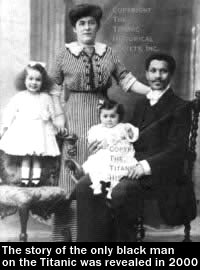
Did Bruce Ismay really encourage Captain Smith to go faster?
During the U.S. Senate's Inquiry into the disaster, Bruce Ismay, the Managing Director of the White Star Line, said the following, "I understand it has been stated that the ship was going at full speed. The ship never had been at full speed. The full speed of the ship is 78 revolutions. She works up to 80. So far as I am aware, she never exceeded 75 revolutions. She had not all her boilers on. None of the single-ended boilers were on." Ismay said that it was their intention to work the ship up to its full speed of 80 revolutions either on the next day (Monday) or two days later (Tuesday), depending on the weather.
Surviving passengers stated that they heard Bruce Ismay pressuring Captain Edward J. Smith to go faster, with one passenger even stating that he saw Ismay flaunting an iceberg warning during dinner. However, none of the surviving officers supported these accusations, and survivor testimony from some passengers was considered unreliable and at worst imaginative. Bruce Ismay was crucified by the newspapers for leaving the ship, and he quickly became a common target upon which to place blame. Yet, it is also possible that the testimony from the surviving officers, exonerating Ismay, was given in the best interest of White Star Line.
Did pieces of ice from the iceberg really land on the promenade deck?
Did the Titanic's band continue to play as the ship went under?
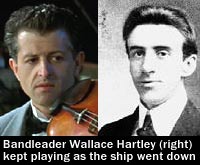
 See a picture of Wallace Hartley's funeral procession. Jonathan Evans Jones, the actor who portrayed Wallace Hartley in James Cameron's Titanic movie, is a professional violinist.
See a picture of Wallace Hartley's funeral procession. Jonathan Evans Jones, the actor who portrayed Wallace Hartley in James Cameron's Titanic movie, is a professional violinist.Were the third class passengers really locked below as the movie Titanic suggests?
Yes, but not exactly in the way that the film implies. Titanic history tells us that gates did exist which barred the third class passengers from the other passengers. However, these gates weren't in place to stop a third class passenger from taking a first class passenger's seat on a lifeboat. Instead, the gates were in place as a regulatory measure to prevent the "less cleanly" third class passengers from transmitting diseases and infections to the others. This would save time when the ship arrived in New York, as only the third class passengers would need a health inspection.
At the time of the sinking, some stewards kept gates locked waiting for instructions, while others allowed women and children to the upper decks. As a result of poor communication from the upper decks, the dire reality of the situation was never conveyed. The crew failed to search for passengers in the cabins and common areas, and the fact that some third class passengers did not speak English, also presented a problem. As a result, many of the third class passengers were left to fend for themselves. Only 25 percent of the third class passengers survived the disaster.
Did Officer Murdoch really commit suicide after shooting passengers and accepting a bribe?
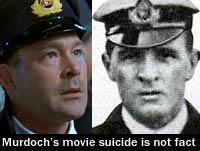
Did one of Titanic's giant funnels really crash down into the water?
 See a collage of John and Madeline Astor. While traveling on their honeymoon, Madeline became pregnant with their son, and she wanted to return home to have the baby in the United States. They booked a first class passage on the RMS Titanic.
See a collage of John and Madeline Astor. While traveling on their honeymoon, Madeline became pregnant with their son, and she wanted to return home to have the baby in the United States. They booked a first class passage on the RMS Titanic.Did some of the passengers choose to go down with the ship?

Did Captain Smith really go into the bridge to await his fate?
In Robert Ballard's book, The Discovery of the Titanic, he claims that Captain Smith went into the bridge to await his fate at 2:17 A.M., three minutes before the ship went under completely.  View a photo of Captain Smith. This may have been partially based on the account of Philadelphia banker Robert W. Daniel, who claimed that just before he jumped into the water, he saw Captain Smith on the bridge, which was slowly being swallowed by the icy sea. James Cameron supports this account in his 1997 movie Titanic by showing Captain Smith enter the bridge and grasp the wheel as water crashes in. While some survivors testified that they saw Captain Smith enter the bridge, other Titanic survivors said that they saw Captain Smith in the water with a life jacket. It is possible that he may have jumped from the bridge area as the ship went down. A boy who was one of the last children to leave the ship told Dr. J.F. Kemp, a passenger on the Carpathia, that "Captain Smith put a pistol to his head and then fell down." Other witnesses reported having seen Captain Smith commit suicide as well. Surviving crewmen vigorously denied the possibility. His body was never recovered.
View a photo of Captain Smith. This may have been partially based on the account of Philadelphia banker Robert W. Daniel, who claimed that just before he jumped into the water, he saw Captain Smith on the bridge, which was slowly being swallowed by the icy sea. James Cameron supports this account in his 1997 movie Titanic by showing Captain Smith enter the bridge and grasp the wheel as water crashes in. While some survivors testified that they saw Captain Smith enter the bridge, other Titanic survivors said that they saw Captain Smith in the water with a life jacket. It is possible that he may have jumped from the bridge area as the ship went down. A boy who was one of the last children to leave the ship told Dr. J.F. Kemp, a passenger on the Carpathia, that "Captain Smith put a pistol to his head and then fell down." Other witnesses reported having seen Captain Smith commit suicide as well. Surviving crewmen vigorously denied the possibility. His body was never recovered.
Did the Titanic's lights continue to burn until just before the ship went under?
Did the Titanic really break apart as it sunk?
Yes. For years, whether the Titanic broke apart as it went under was a highly debated element of Titanic history. Some survivors testified that the ship did break apart as it sunk, while others said that it went under intact. Much of the uncertainty surrounding this was put to rest in 1985 when the wreck of the Titanic was discovered in two separate portions on the sea bottom. It is very likely that the ship broke apart much like the movie's depiction.
Were any of the passengers rescued from the water like Rose?
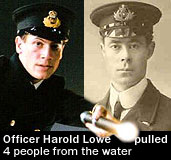
How did Margaret Brown get the nickname "Unsinkable Molly Brown"?
When the Carpathia arrived at New York's pier 54, over 30,000 people, including reporters, clamored to interview the Titanic survivors. When reporters asked Margaret Brown to what she attributed her survival, Margaret replied, "Typical Brown luck. We're unsinkable." Reporters began referring to her as the "Unsinkable Mrs. Brown".  See a photo collage of Margaret "Molly" Brown. The nickname of "Molly" was a Hollywood invention created years later in the 1930s. It was part of a highly fictional tale that became the basis for the 1960 Broadway musical, The Unsinkable Molly Brown. In the movie Titanic, we get a glimpse of the friendship between Margaret Brown and John Jacob Astor. Before boarding the ship, Margaret had been traveling with J.J. Astor and his wife Madeline in Cairo, Egypt. Margaret booked a First Class passage on the Titanic after learning that her grandson Lawrence was ill.
See a photo collage of Margaret "Molly" Brown. The nickname of "Molly" was a Hollywood invention created years later in the 1930s. It was part of a highly fictional tale that became the basis for the 1960 Broadway musical, The Unsinkable Molly Brown. In the movie Titanic, we get a glimpse of the friendship between Margaret Brown and John Jacob Astor. Before boarding the ship, Margaret had been traveling with J.J. Astor and his wife Madeline in Cairo, Egypt. Margaret booked a First Class passage on the Titanic after learning that her grandson Lawrence was ill.
How long could the people have remained alive in the water?
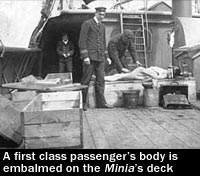
How many people were rescued by the Carpathia?
 View a photo of the Titanic's lifeboats approaching the Carpathia. In all, 711 passengers were rescued and over 1500 perished in the disaster. Among the passengers rescued were 58 men; all of whom came under public scrutiny after news broke that approximately 150 women and children died (mostly from Second and Third class). Titanic survivor Adolphe Saalfeld said of the Carpathia, "The Captain and Officers of the Carpathia did all that was possible to make us comfortable, and to those that were sick or injured; they gave their most tender care. The icebergs were huge and the weather extremely rough on the voyage to New York."
View a photo of the Titanic's lifeboats approaching the Carpathia. In all, 711 passengers were rescued and over 1500 perished in the disaster. Among the passengers rescued were 58 men; all of whom came under public scrutiny after news broke that approximately 150 women and children died (mostly from Second and Third class). Titanic survivor Adolphe Saalfeld said of the Carpathia, "The Captain and Officers of the Carpathia did all that was possible to make us comfortable, and to those that were sick or injured; they gave their most tender care. The icebergs were huge and the weather extremely rough on the voyage to New York."Did Bruce Ismay really sneak into a lifeboat like in the movie Titanic?
No. There are no reports of Bruce Ismay disguising himself as a woman to sneak into a lifeboat as he does in the movie. However, First Class Passenger Jack Thayer said that he saw Bruce Ismay pushing his way into Collapsible C. Thayer "did not blame him," because from what Thayer could see, "It was really every man for himself." Of the 58 men who survived, Bruce Ismay, the Managing Director of the White Star Line, received the most criticism, and in 1913, Ismay resigned from his job and from public life. London society labeled Bruce Ismay one of the biggest cowards in history, and both the American and English press ruthlessly attacked him. Some papers even published cartoons of Ismay deserting the ship.
Was the Heart of the Ocean (Coeur de la Mer) a real diamond?
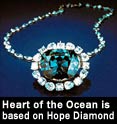
Can I visit the Titanic movie set?
Yes. The set, located at Fox's Baja Studios in Rosarito Beach, Mexico, still exists. The nearly full-scale Titanic replica created for the film was badly damaged when the filmmakers submerged it underwater to recreate the sinking. It was dismantled after filming wrapped. However, several of the Titanic interiors are still there, including Rose's 1st class stateroom, Jack's 3rd class stateroom, the purser's office (where Jack was handcuffed to the pipe), the outside deck, and the Palm Court (dining) room. Tours are available to the public.
Like the original ship, the replica (when it existed) was 60 feet from the boat deck to the water. Certain repetitive lengthwise sections of the ship were omitted, which made it shorter than the original 882.5 foot ship. The movie ship had only been completed on one side. As a result, there are several scenes in which the ship is reversed, such as in the "I'm the king of the world" scene where the crew galley skylight gives the reversal away. Very few of the ship's interiors were built into the replica's framework itself. Most were built on neighboring sound stages. The set designs, costumes and the ship itself were meticulously recreated.  View a comparison photo of Titanic's Grand Staircase. In several cases, James Cameron even hired the original manufacturers to reproduce such things as carpets and lifeboat davits.
View a comparison photo of Titanic's Grand Staircase. In several cases, James Cameron even hired the original manufacturers to reproduce such things as carpets and lifeboat davits.
Listen to Titanic Survivor Accounts:
Survivors from Southampton, UK talk about their experiences on the night of the Titanic disaster. The last audio clip features Southampton local Iris Lee telling her story of how her father gave up his position on the Titanic. She explains that he was too shook up to go after discovering a human head floating by while at work in the docks.
 Edith Haisman, 7, Traveling to Canada with Parents - 3:32
Edith Haisman, 7, Traveling to Canada with Parents - 3:32
"There was a lot of lifeboats and people on rafts, some of them frozen dead, it was terrible. ... You heard the screams, it was terrible, the screams of the people. ... I hoped my father would get off the ship. That's all I was hoping for."

 Eva Hart (7) Recalls Her Memories of the Sinking - 13:06
Eva Hart (7) Recalls Her Memories of the Sinking - 13:06
"We were offered a birth on the Titanic. ... My mother had this dreadful premonition. She never had one before and she never had one after. But she said, 'No, we can't do this. It's quite wrong. Something dreadful will happen.'"

 Iris Lee, local resident, Southampton - 1:17
Iris Lee, local resident, Southampton - 1:17
"...he wasn't able to take his position on the Titanic, so that's why my parents used to say they were thankful to God."
Video Footage of the Real Titanic
In our first selection below, take a journey into history by watching a compilation of real Titanic video footage. See the actual ship and the real Captain Edward J. Smith on the bridge prior to leaving. Witness the aftermath as the Carpathia returns with survivors.
Link-to-Learn More:
- Survivor Testimony at the Titanic Inquiry Project
- Titanic Passenger List at Encyclopedia Titanica
- Read The Sinking of the Titanic by Logan Marshall
- Photos of the Titanic's Interior, Exterior, and Construction
- Dr. Washington Dodge Gives Story of Rescue | Dodge's Wife's Account
- Letter From Survivor Mary Sloan to her Sister
- Letter Written from Richard Geddes to his Wife (Richard did not Survive)
- 12 Mighty Orphans
- 12 Strong
- 12 Years a Slave
- 13 Hours
- 15:17 to Paris, The
- 1917
- 2 Hearts
- 21
- 22 July
- 300
- 300: Rise of an Empire
- 42
- 80 for Brady
- A Beautiful Day in the Neighborhood
- A Journal for Jordan
- A Million Miles Away
- A Small Light
- Act, The
- Adaptation
- Adrift
- Against the Ice
- Air
- All Eyez on Me
- All My Life
- All Saints
- Alpha Dog
- American Gangster
- American Hustle
- American Made
- American Sniper
- American Underdog
- Amityville Horror (1979)
- Amityville Horror (2005)
- Annabelle
- Annabelle: Creation
- Anthropoid
- Antwone Fisher
- Argo
- Arthur the King
- Bad Education
- Bandit
- Battle of the Sexes
- Beanie Bubble, The
- Beautiful Boy
- Beauty and the Beast
- Being the Ricardos
- Bessie
- Best of Enemies, The
- Big Eyes
- Big Lebowski
- Big Short, The
- Big Sick, The
- Bikeriders, The
- Black Bird
- Black Mass
- BlackBerry
- BlacKkKlansman
- Bleed for This
- Blind Side, The
- Bling Ring, The
- Blonde
- Bloodsport
- Blue Miracle
- Boardwalk Empire
- Bohemian Rhapsody
- Boston Strangler
- Boys Don't Cry
- Boys in the Boat, The
- Breach
- Breaking
- Breakthrough
- Brian Banks
- Bridge of Spies
- Burial, The
- Butler, The
- Bye Bye Man, The
- Cabrini
- Calendar Girls
- Can You Ever Forgive Me?
- Candy
- Capone
- Captain Phillips
- Captive
- Case for Christ, The
- Casino
- Catch Me If You Can
- Charlie Wilson's War
- Chasing Mavericks
- Chernobyl
- Clouds
- Cocaine Bear
- Concrete Cowboy
- Concussion
- Conjuring 2, The
- Conjuring, The
- Conjuring: The Devil Made Me Do It, The
- Courier, The
- Crowded Room, The
- Crown, The
- Current War, The
- Danish Girl, The
- Danny Collins
- Darkest Hour
- Dear Edward
- Death of Stalin, The
- Deepwater Horizon
- Deliver Us From Evil
- Detroit
- Devil Wears Prada, The
- Devotion
- Diana
- Dig, The
- Dirt, The
- Disappointments Room, The
- Disaster Artist, The
- Dog Gone
- Dolemite Is My Name
- Donnie Brasco
- Downton Abbey
- Dr. Death
- Dragon: The Bruce Lee Story
- Dream Horse
- Dropout, The
- Dumb Money
- Dunkirk
- Eddie the Eagle
- Elvis
- Emancipation
- End of the Tour, The
- Entourage
- Erin Brockovich
- Everest
- Exorcism of Emily Rose, The
- Extremely Wicked, Shockingly Evil and Vile
- Eyes of Tammy Faye, The
- Fabelmans, The
- Farewell, The
- Father Stu
- Fatherhood
- Fault in Our Stars, The
- Favourite, The
- Ferrari
- Fighter, The
- Fighting with My Family
- Finding Neverland
- Finest Hours, The
- First Man
- Five Days at Memorial
- Flamin' Hot
- Florence Foster Jenkins
- For Life
- Ford v Ferrari
- Founder, The
- Foxcatcher
- Franklin
- Free State of Jones
- Freedom Writers
- Frida
- Genius
- Get On Up
- Gigi and Nate
- Girl from Plainville, The
- Glass Castle, The
- Gold
- Goldbergs, The
- Good Nurse, The
- Good on Paper
- Goodbye Christopher Robin
- Goodfellas
- Gran Turismo
- Greatest Beer Run Ever, The
- Greatest Showman, The
- Green Book
- Greyhound
- Gridiron Gang
- Hacksaw Ridge
- Hamilton
- Hands of Stone
- Harriet
- Haunting in Connecticut, The
- Heaven is for Real
- Hidden Figures
- Hill, The
- Hillbilly Elegy
- Hit Man
- Hollywoodland
- Home Team
- Hoosiers
- Hours, The
- House of Gucci
- Hurricane, The
- Hustlers
- I Am the Night
- I Can Only Imagine
- I Saw the Light
- I Still Believe
- I Wanna Dance with Somebody
- I, Tonya
- Imitation Game, The
- Infiltrator, The
- Inventing Anna
- Invincible
- Irishman, The
- Iron Claw, The
- Jaws
- Jerry and Marge Go Large
- Jersey Boys
- Jesus Revolution
- Jimi: All Is by My Side
- Jobs
- Joe Bell
- Joy
- Judas and the Black Messiah
- Judy
- Just Mercy
- Kill the Messenger
- Killers of the Flower Moon
- King Arthur
- King Richard
- Lady Bird
- Lady in the Lake
- Last Duel, The
- Last Full Measure, The
- League of Their Own, A
- Lee
- Lion
- Lone Survivor
- Lost City of Z, The
- Lost Girls
- Loving
- Ma Rainey's Black Bottom
- Maestro
- Maggie Moore(s)
- Maid
- Man Who Invented Christmas, The
- Manhattan
- Mank
- Marshall
- Masters of the Air
- Mauritanian, The
- McFarland, USA
- Megan Leavey
- Men of Honor
- Midway
- Military Wives
- Million Dollar Arm
- Minamata
- Ministry of Ungentlemanly Warfare, The
- Miracle
- Miracles from Heaven
- Molly's Game
- Monster
- Monster: The Ed Gein Story
- Monuments Men, The
- Mothman Prophecies, The
- Mrs. America
- Mule, The
- Munich: The Edge of War
- My All American
- Napoleon
- Next Goal Wins
- Not Without My Daughter
- Notorious
- Nun, The
- Nyad
- Old Man & the Gun, The
- On a Wing and a Prayer
- Once Upon a Time in Hollywood
- One and Only Ivan, The
- Only the Brave
- Operation Finale
- Operation Mincemeat
- Oppenheimer
- Ordinary Angels
- Our Friend
- Outlaw King
- Outpost, The
- Pain & Gain
- Pain Hustlers
- Passion of the Christ, The
- Patch Adams
- Paterno
- Patriots Day
- Pawn Sacrifice
- Penguin Bloom
- People v. O.J. Simpson, The
- Pianist, The
- Pope's Exorcist, The
- Post, The
- Prayer Before Dawn, A
- Promise, The
- Public Enemies
- Pursuit of Happyness, The
- Queen of Katwe
- Queenpins
- Quiet Ones, The
- Race
- Radio
- Railway Man, The
- Reagan
- Reality
- Remember the Titans
- Rescued by Ruby
- Respect
- Revenant, The
- Richard Jewell
- Right Stuff, The
- Rite, The
- Rocketman
- Rookie, The
- Rudy
- Rush
- Safety
- Saving Mr. Banks
- Saving Private Ryan
- Schindler's List
- Scoop
- Seabiscuit
- Self Made
- Sergio
- Serpent, The
- Skin
- Slender Man
- Social Network, The
- Society of the Snow
- Son of God
- Soul Surfer
- Sound of Freedom
- Spencer
- Spotlight
- Staircase, The
- Steve Jobs
- Stronger
- Sully
- Survivor, The
- Tag
- Tender Bar, The
- Tetris
- Texas Chainsaw Massacre, The
- Texas Rising
- Theory of Everything, The
- Thing About Pam, The
- Thirteen Lives
- Tiger King
- Till
- Titanic
- To Write Love on Her Arms
- Togo
- Tolkien
- Top Gun: Maverick
- Trees of Peace
- Trial of the Chicago 7, The
- True Spirit
- Unbroken
- Unfrosted
- United 93
- United Kingdom, A
- United States vs. Billie Holiday, The
- Unsung Hero
- Upside, The
- Vice
- Victoria and Abdul
- Waco
- Walk the Line
- Walk, The
- War Dogs
- Watcher, The
- We Own This City
- We Were the Lucky Ones
- WeCrashed
- Weird: The Al Yankovic Story
- Welcome to Marwen
- When the Game Stands Tall
- When They See Us
- White Boy Rick
- White House Plumbers
- Wicked Little Letters
- Wild
- Wolf of Wall Street, The
- Woman in Gold
- Woman King, The
- Worth
- Young Woman and the Sea
- Zodiac
- Zookeeper's Wife, The








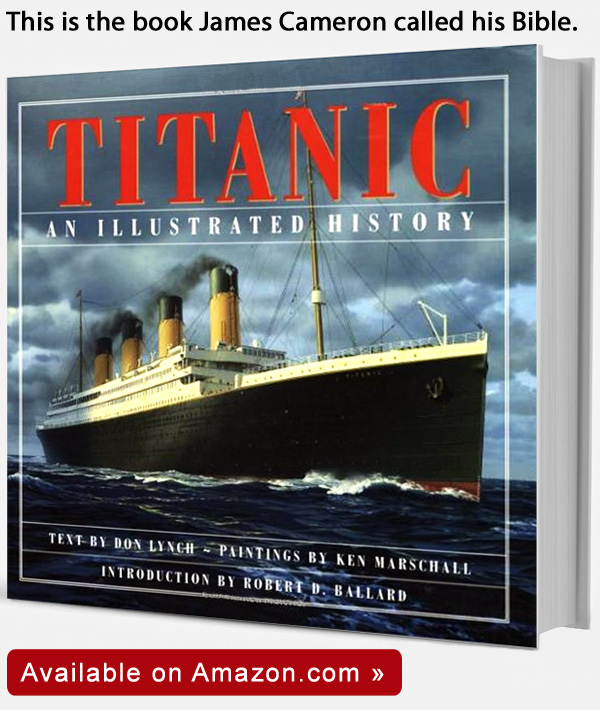

 Titanic Special Collector's Edition DVD
Titanic Special Collector's Edition DVD Ghosts of the Abyss
Ghosts of the Abyss Titanic: An Illustrated History
Titanic: An Illustrated History Titanic Soundtrack
Titanic Soundtrack